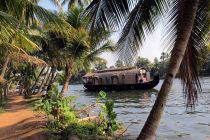 If you had told me a few weeks ago that I would be paddling a canoe in the backwaters of Kerala I would I would not have believed it. But another GrownUp (my intrepid sister) and my daughter (our tour leader) somehow persuaded me to jump into a 10 foot old wooden canoe with them and paddle for 2 hours. By the end of the journey our hands were blistered and it was pitch-dark. Fortunately we had a small Khatmandu headlamp to guide us on our way and managed to arrive back safely.
If you had told me a few weeks ago that I would be paddling a canoe in the backwaters of Kerala I would I would not have believed it. But another GrownUp (my intrepid sister) and my daughter (our tour leader) somehow persuaded me to jump into a 10 foot old wooden canoe with them and paddle for 2 hours. By the end of the journey our hands were blistered and it was pitch-dark. Fortunately we had a small Khatmandu headlamp to guide us on our way and managed to arrive back safely.
Our canoe was hired from Green Palms homestay which is on Chennamkary Island, near Alleppey town in Kerala. The family who ran it were locals who knew the way of life and the history of the island intimately and were keen to share their knowledge.
In the early morning we walked around the village, on a path which cut through green paddy fields before twisting along a palm fringed shore. Some of the villagers were busy pounding their clothes on the rocks and rinsing their clothes in the water or occasionally brushing their teeth. Sadly due to the large number of houseboats carrying tourists these backwaters are becoming increasingly murky and polluted, making them a health hazard.
All the meals were cooked by mother Anna and her team. At her cooking class I learnt some of the secrets of Keralan cooking: how to make a fresh coconut chutney, beetroot thoran, a mildly spiced potato dish, and fish in a bright red chili marinade fried in a mixture of coconut oil and curry leaves. This feast was served up to all the guests for lunch.
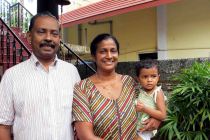 Green Palms was one of several homestays where we stayed in Kerala. Some of our other favourites were:
Green Palms was one of several homestays where we stayed in Kerala. Some of our other favourites were:
Beena’s homestay, in the heart of Fort Cochin which gained first place in Trip Advisor’s Traveller’s choice award in 2011. What made it special was the warm welcome and gracious hospitality. We were treated like family. At $15 a night which included breakfast and dinner it was also outrageously cheap.
Here we first tasted a typical Keralan breakfast food called puttu which was made the traditional way by alternating layers of coarse rice flour and freshly grated coconut in a hollow bamboo tube, and steaming it.
For dinner each night an array of traditional Keralan dishes, rice, dhal and bowls of fresh fruit were served up around a large table where all the guests mixed and mingled and shared their travelling stories.
At our request Beena booked us into a traditional ayurvedic massage clinic where we each lay on a plastic covered wooden table and were thoroughly massaged. It did become very slippery from all the aromatic oil that was used.
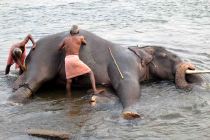 She also arranged a jeep to take us to Munnar, our next destination and suggested we leave in the early morning to visit an orphan elephant sanctuary. We watched them wallowing in the river and being scrubbed down with coconut shells by their mahouts. It was a highlight of our Kerala journey.
She also arranged a jeep to take us to Munnar, our next destination and suggested we leave in the early morning to visit an orphan elephant sanctuary. We watched them wallowing in the river and being scrubbed down with coconut shells by their mahouts. It was a highlight of our Kerala journey.
Another favourite homestay was Gumnut Beach house on Temple Road in Varkala. This homestay was run by Rose, an Australian and her husband Radha. From there it was a short walk away from Varkhala beach.
At one end of the beach Indian gurus was praying with their followers: the women modestly clad in saris or shalwar khameez, the men in dhotis. At the other end bikini clad westerners were sunbathing. It was swelteringly hot so it was a relief to take a dip in the ocean.
Rose came to the town centre with us. We travelled on a local bus, standing up and holding on for dear life. She guided us to a local café where for the princely price of 35 cents we had a sumptuous Keralan vegetarian thali with many different little dishes, plentiful rice and spicy dhal and coconut gravies poured from large stainless steel jugs.
She took us to the local beauty parlour. For two hours we were pampered, our feet scraped, our legs massaged and as a final touch we allowed our toe nails to be painted in bright colours.
The following morning Rose got up very early in the morning to see us on our way and when the taxi did not appear on time, a local stopped and at her request kindly agreed to take us to the railway station.
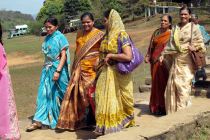 Staying in homestays was much less expensive and much more fun than staying in large hotels. Our hosts made us feel very welcome and were able to give us lots of advice about what to do and see. The ones we stayed in were spotlessly clean. Some or all of the meals were provided.
Staying in homestays was much less expensive and much more fun than staying in large hotels. Our hosts made us feel very welcome and were able to give us lots of advice about what to do and see. The ones we stayed in were spotlessly clean. Some or all of the meals were provided.
Back home now memories keep flooding back of a land of contrasts. A lush green landscape of tea plantations, coconut palms and paddy fields but also heavy pollution and reckless driving on overcrowded roads. The constant tooting still rings in my ears.
A land of moustachioed men casually dressed in dhotis and women in a rainbow of colourful elegant saris. Large homes painted in bright pastel colours as well as ramshackle shanties. Wealth and poverty sitting cheek by jowl.
Unfamiliar delicious spicy Keralan dishes often laced with coconut, as well as good coffee and toast with jam or wild honey.
A friendly place where people treated us with well and 3 women on their own felt at ease and safe to travel.








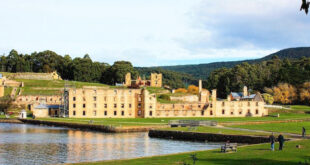
- 12 years ago
Thanks , I am Tourist friend from Varkala Beacv Kerala India. Good to know